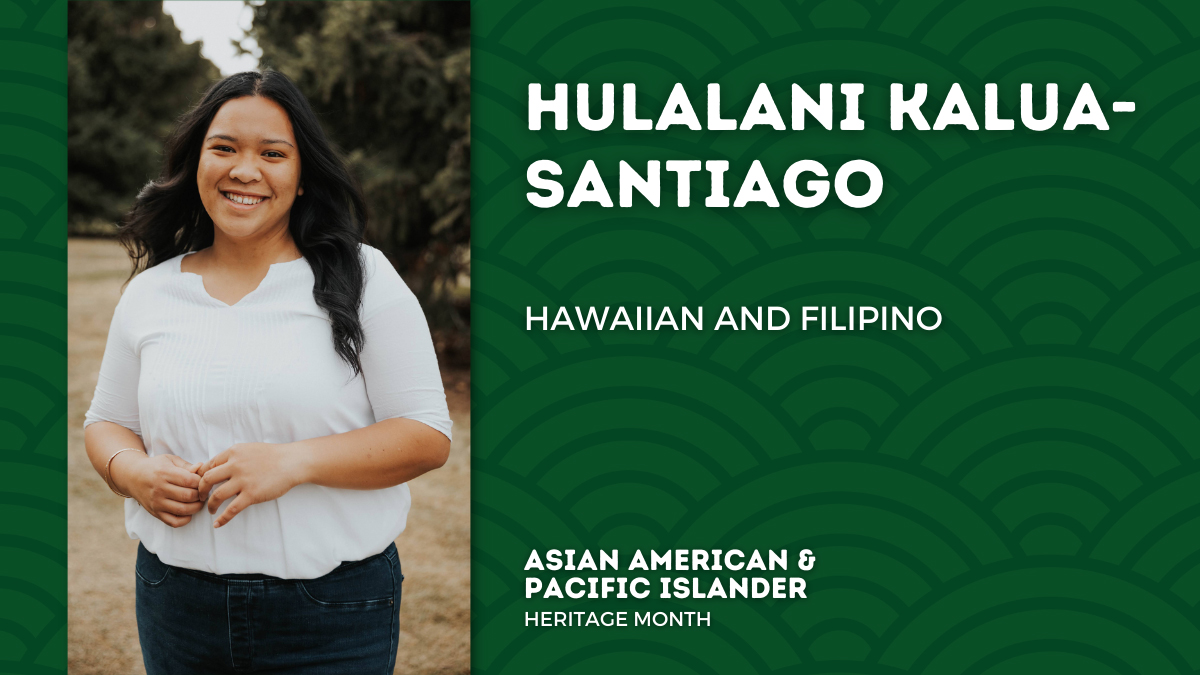For Hula Kalua-Santiago, the first step to kindness is being aware of others and their needs, no matter their background or heritage.

For Hula Kalua-Santiago, the first step to kindness is being aware of others and their needs, no matter their background or heritage. Hula is a student of Hawaiian and Filipino descent at Utah Valley University (UVU). She serves as assistant to the director for the Pacific Islander Initiative in the Multicultural Student Services (MSS) office. Currently studying elementary education, she aspires to be a third-grade teacher when she graduates in two years and, sometime in the future, work as a counselor or advisor.
Hula grew up in Hawaii. She lived on Oahu, Molokai, and Maui and attended a private boarding school from seventh grade to her senior year of high school. Minus flying home on the weekends, Hula seldom saw her family. As a result, Hula grew up to be very independent.
College was always Hula's goal, and she studied at Brigham Young University–Hawaii for a few years. After that, she served a mission for the Church of Jesus Christ of Latter-day Saints in the Philippines. That was an amazing opportunity for her to be living in a place of some of her heritage. After that, she went back to school, and then her family decided to move to Utah in 2017. They told her it was up to her whether she wanted to come with them or stay in Hawaii. Feeling inspired to chase new opportunities, Hula chose to move to Utah.
Hula’s boss, Leone M. Saaga, whom she calls "auntie,” is someone she knew while growing up. When Hula first moved to Utah, Saaga reached out to her and told her about MSS. Excited by the prospect of being involved with MSS, Hula applied to UVU and started school in 2017, then shortly paused her education to adjust to the financial implications and culture shock of moving from Hawaii to Utah. “I took a break from school, and I was just working at an elementary school as a behavioral aide. That really firmed up my desire to be a teacher and work with kids.”
Besides the obvious differences in weather — going from hot and humid Hawaii to cold and dry Utah — Hula said that it was especially hard to come to a place where she was in the racial minority. “I'd never been in the minority, especially living in Hawaii for pretty much all my life,” Hula said. “Not seeing as many people like me and not having people understand how I speak, or my mannerisms sometimes, was very, very different.”
Hula described the positive and negative aspects of discussing her background with others. “When people find out I'm from Hawaii and my name is Hula, they're like, ‘Oh, do you know how to dance hula? Can you help us do this event or teach us how to dance?’ Sometimes I think, I'm not your token Hawaiian person. But, it's also good because then there's more awareness of my culture.”
Some people react more negatively when they see her, Hula explained. “Whether it be how I look or the food I eat, or because when Polynesians get together, they're very loud — I don't know why, but sometimes people don't like it. And they'll give us weird stares. Sometimes it can get discouraging. I've noticed that a lot and with our other students as well.”
Through her experiences of living in several different places and moving to Utah, Hula believes that it’s important not to judge a book by its cover since we can’t know a person until we talk with them and get to know them.
“Sometimes people aren't aware of what they say or how they look at people,” Hula said. “Being aware of how you treat others, you'll know how to change — how to act accordingly or be kinder and be better.”
Despite challenges involving prejudice and racism, Hula has had a positive experience at UVU, in part due to the warmth and support MSS extended to her.
“All of my bosses and all the advisors there are very accommodating and super helpful,” Hula said. “Whether it be projects or even minor tutoring, or giving letters of reference and stuff like that, they're very much like a family. I've seen MSS try to do that for other students as well.”
Since working while attending school hasn’t paid all the bills, MSS also helped Hula finance her education by providing tuition scholarships. Though MSS doesn’t have enough funding to provide everyone with scholarships, they make a point to reach out to students and help them feel like they have a place.
The Pacific Islander Initiative recently finished two intercollegiate events with the Utah Pacific Islander Association. Universities including the University of Utah, Weber State, Utah State, Salt Lake Community College, Southern Utah University, and Red Rock University came together for an overnight leadership retreat on UVU’s campus. They also did a showcase at Weber to encourage Pacific Islander students to enroll in and stay in school.
“There's help everywhere, especially at UVU,” Hula said. “There's a lot of opportunities. And people like me, or people who are different or don't see themselves at big universities, can do it. Everyone can do it.”